大学英语第二版第二册原文翻译
- 格式:doc
- 大小:46.50 KB
- 文档页数:3
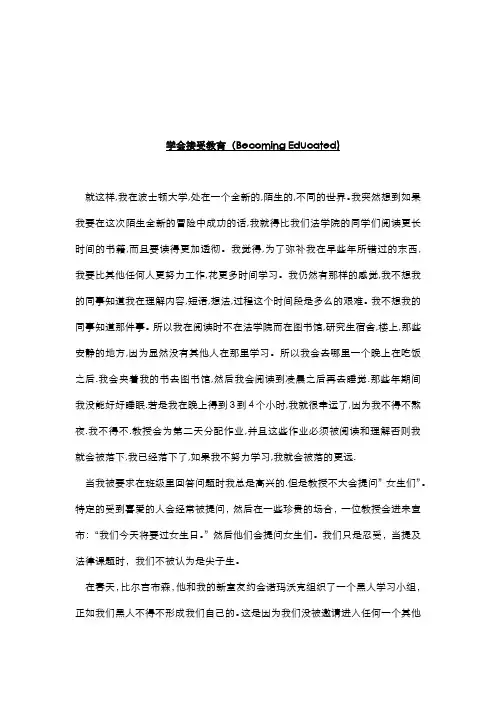
学会接受教育(Becoming Educated)就这样,我在波士顿大学,处在一个全新的,陌生的,不同的世界。
我突然想到如果我要在这次陌生全新的冒险中成功的话,我就得比我们法学院的同学们阅读更长时间的书籍,而且要读得更加透彻。
我觉得,为了弥补我在早些年所错过的东西,我要比其他任何人更努力工作,花更多时间学习。
我仍然有那样的感觉,我不想我的同事知道我在理解内容,短语,想法,过程这个时间段是多么的艰难。
我不想我的同事知道那件事。
所以我在阅读时不在法学院而在图书馆,研究生宿舍,楼上,那些安静的地方,因为显然没有其他人在那里学习。
所以我会去哪里一个晚上在吃饭之后.我会夹着我的书去图书馆,然后我会阅读到凌晨之后再去睡觉.那些年期间我没能好好睡眠.若是我在晚上得到3到4个小时,我就很幸运了,因为我不得不熬夜.我不得不.教授会为第二天分配作业,并且这些作业必须被阅读和理解否则我就会被落下,我已经落下了,如果我不努力学习,我就会被落的更远.当我被要求在班级里回答问题时我总是高兴的.但是教授不大会提问”女生们”。
特定的受到喜爱的人会经常被提问,然后在一些珍贵的场合,一位教授会进来宣布:“我们今天将要过女生日。
”然后他们会提问女生们。
我们只是忍受,当提及法律课题时,我们不被认为是尖子生。
在春天,比尔吉布森,他和我的新室友约会诺玛沃克组织了一个黑人学习小组,正如我们黑人不得不形成我们自己的。
这是因为我们没被邀请进入任何一个其他的学习小组。
我们组有6/7个成员,比尔和萨还有梅纳德杰克逊收集交流和听取我们怎么做。
我学到的一件事是,我们必须讲出来,问题,事实,案例还是过程。
我们不能仅仅阅读案例,独自在图书馆里学习,正如我以前一直那样,呆在教室里学不到全部。
但一旦我们在学习小组中讲出来了,接下来就变得更简单更容易理解了。
我不时会去罗利街2号看看路易斯是怎么做的。
她总是在看《红书》。
在那里我每次想要和她讨论某件事的时候,她会同时在阅读《红书》上的一则简短的故事。

学会接受教育(Becoming Educated)就这样,我在波士顿大学,处在一个全新的,陌生的,不同的世界。
我突然想到如果我要在这次陌生全新的冒险中成功的话,我就得比我们法学院的同学们阅读更长时间的书籍,而且要读得更加透彻。
我觉得,为了弥补我在早些年所错过的东西,我要比其他任何人更努力工作,花更多时间学习。
我仍然有那样的感觉,我不想我的同事知道我在理解内容,短语,想法,过程这个时间段是多么的艰难。
我不想我的同事知道那件事。
所以我在阅读时不在法学院而在图书馆,研究生宿舍,楼上,那些安静的地方,因为显然没有其他人在那里学习。
所以我会去哪里一个晚上在吃饭之后.我会夹着我的书去图书馆,然后我会阅读到凌晨之后再去睡觉.那些年期间我没能好好睡眠.若是我在晚上得到3到4个小时,我就很幸运了,因为我不得不熬夜.我不得不.教授会为第二天分配作业,并且这些作业必须被阅读和理解否则我就会被落下,我已经落下了,如果我不努力学习,我就会被落的更远.当我被要求在班级里回答问题时我总是高兴的.但是教授不大会提问”女生们”。
特定的受到喜爱的人会经常被提问,然后在一些珍贵的场合,一位教授会进来宣布:“我们今天将要过女生日。
”然后他们会提问女生们。
我们只是忍受,当提及法律课题时,我们不被认为是尖子生。
在春天,比尔吉布森,他和我的新室友约会诺玛沃克组织了一个黑人学习小组,正如我们黑人不得不形成我们自己的。
这是因为我们没被邀请进入任何一个其他的学习小组。
我们组有6/7个成员,比尔和萨还有梅纳德杰克逊收集交流和听取我们怎么做。
我学到的一件事是,我们必须讲出来,问题,事实,案例还是过程。
我们不能仅仅阅读案例,独自在图书馆里学习,正如我以前一直那样,呆在教室里学不到全部。
但一旦我们在学习小组中讲出来了,接下来就变得更简单更容易理解了。
我不时会去罗利街2号看看路易斯是怎么做的。
她总是在看《红书》。
在那里我每次想要和她讨论某件事的时候,她会同时在阅读《红书》上的一则简短的故事。
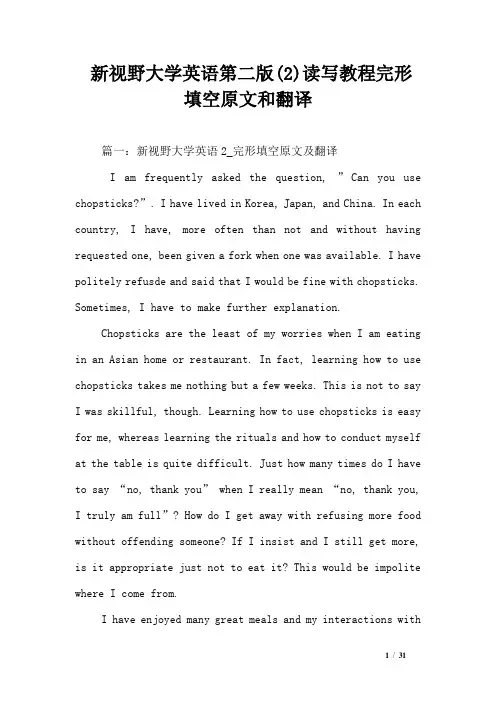
新视野大学英语第二版(2)读写教程完形填空原文和翻译篇一:新视野大学英语2_完形填空原文及翻译I am frequently asked the question, ”Can you use chopsticks?”. I have lived in Korea, Japan, and China. In each country, I have, more often than not and without having requested one, been given a fork when one was available. I have politely refusde and said that I would be fine with chopsticks. Sometimes, I have to make further explanation.Chopsticks are the least of my worries when I am eating in an Asian home or restaurant. In fact, learning how to use chopsticks takes me nothing but a few weeks. This is not to say I was skillful, though. Learning how to use chopsticks is easy for me, whereas learning the rituals and how to conduct myself at the table is quite difficult. Just how many times do I have to say “no, thank you” when I really mean “no, thank you, I truly am full”? How do I get away with refusing more food without offending someone? If I insist and I still get more, is it appropriate just not to eat it? This would be impolite where I come from.I have enjoyed many great meals and my interactions withthe people have been great. I am increasingly aware that I will never be able to give back as much as I have received. I don’t know how I can ever thank all of the people who introducde me to eating in Asia. 我常问的问题,“你会用筷子吗?“。
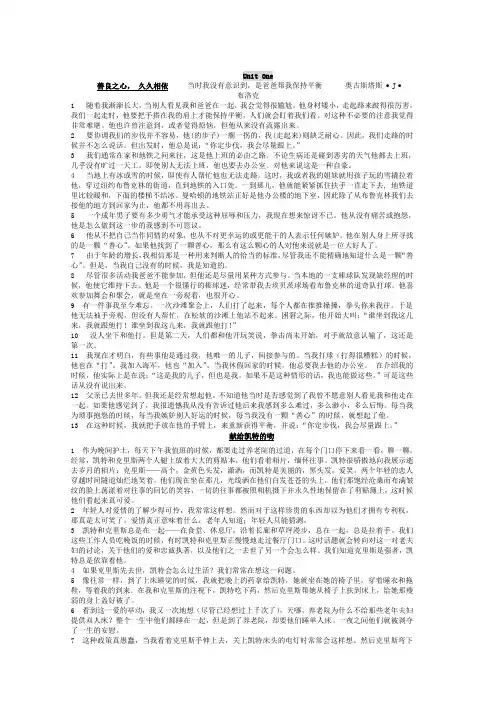
Unit One善良之心,久久相依当时我没有意识到,是爸爸帮我保持平衡奥古斯塔斯∙J ∙布洛克1 随着我渐渐长大,当别人看见我和爸爸在一起,我会觉得很尴尬。
他身材矮小,走起路来跛得很厉害。
我们一起走时,他要把手搭在我的肩上才能保持平衡,人们就会盯着我们看。
对这种不必要的注意我觉得非常难堪。
他也许曾注意到,或者觉得烦恼,但他从来没有流露出来。
2 要协调我们的步伐并不容易,他(的步子)一瘸一拐的,我(走起来)则缺乏耐心。
因此,我们走路的时候并不怎么说话。
但出发时,他总是说:“你定步伐,我会尽量跟上。
”3 我们通常在家和地铁之间来往,这是他上班的必由之路。
不论生病还是碰到恶劣的天气他都去上班,几乎没有旷过一天工。
即使别人无法上班,他也要去办公室。
对他来说这是一种自豪。
4 当地上有冰或雪的时候,即使有人帮忙他也无法走路。
这时,我或者我的姐妹就用孩子玩的雪撬拉着他,穿过纽约布鲁克林的街道,直到地铁的入口处。
一到那儿,他就能紧紧抓住扶手一直走下去, 地铁道里比较暖和,下面的楼梯不结冰。
曼哈顿的地铁站正好是他办公楼的地下室,因此除了从布鲁克林我们去接他的地方到回家为止,他都不用再出去。
5 一个成年男子要有多少勇气才能承受这种屈辱和压力,我现在想来惊讶不已。
他从没有痛苦或抱怨,他是怎么做到这一步的我感到不可思议。
6 他从不把自己当作同情的对象,也从不对更幸运的或更能干的人表示任何嫉妒。
他在别人身上所寻找的是一颗“善心”。
如果他找到了一颗善心,那么有这么颗心的人对他来说就是一位大好人了。
7 由于年龄的增长,我相信那是一种用来判断人的恰当的标准,尽管我还不能精确地知道什么是一颗“善心”。
但是,当我自己没有的时候,我是知道的。
8 尽管很多活动我爸爸不能参加,但他还是尽量用某种方式参与。
当本地的一支棒球队发现缺经理的时候,他使它维持下去。
他是一个很懂行的棒球迷,经常带我去埃贝茨球场看布鲁克林的道奇队打球。
他喜欢参加舞会和聚会,就是坐在一旁观看,也很开心。
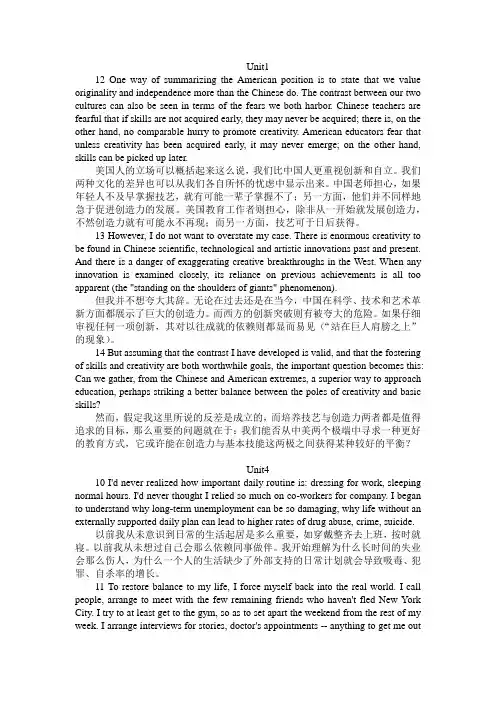
Unit112 One way of summarizing the American position is to state that we value originality and independence more than the Chinese do. The contrast between our two cultures can also be seen in terms of the fears we both harbor. Chinese teachers are fearful that if skills are not acquired early, they may never be acquired; there is, on the other hand, no comparable hurry to promote creativity. American educators fear that unless creativity has been acquired early, it may never emerge; on the other hand, skills can be picked up later.美国人的立场可以概括起来这么说,我们比中国人更重视创新和自立。
我们两种文化的差异也可以从我们各自所怀的忧虑中显示出来。
中国老师担心,如果年轻人不及早掌握技艺,就有可能一辈子掌握不了;另一方面,他们并不同样地急于促进创造力的发展。
美国教育工作者则担心,除非从一开始就发展创造力,不然创造力就有可能永不再现;而另一方面,技艺可于日后获得。
13 However, I do not want to overstate my case. There is enormous creativity to be found in Chinese scientific, technological and artistic innovations past and present. And there is a danger of exaggerating creative breakthroughs in the West. When any innovation is examined closely, its reliance on previous achievements is all too apparent (the "standing on the shoulders of giants" phenomenon).但我并不想夸大其辞。
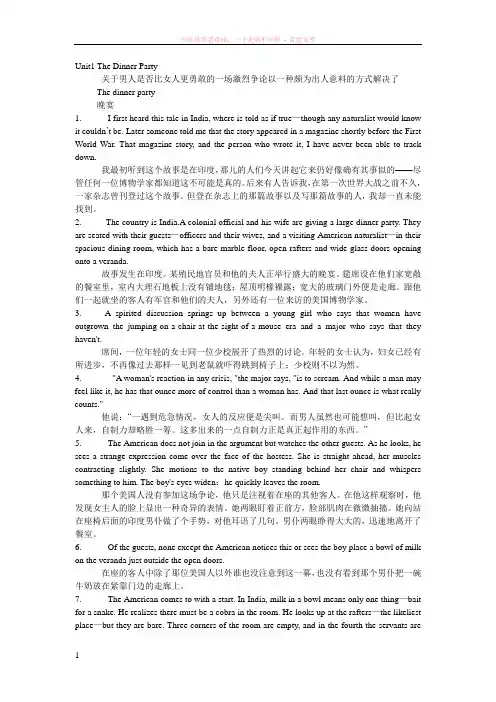
Unit1 The Dinner Party关于男人是否比女人更勇敢的一场激烈争论以一种颇为出人意料的方式解决了The dinner party晚宴1. I first heard this tale in India, where is told as if true—though any naturalist would know it couldn’t be. Later someone told me that the story appeared in a magazine shortly before the First World War. That magazine story, and the person who wrote it, I have never been able to track down.我最初听到这个故事是在印度,那儿的人们今天讲起它来仍好像确有其事似的——尽管任何一位博物学家都知道这不可能是真的。
后来有人告诉我,在第一次世界大战之前不久,一家杂志曾刊登过这个故事。
但登在杂志上的那篇故事以及写那篇故事的人,我却一直未能找到。
2.The country is India.A colonial official and his wife are giving a large dinner party. They are seated with their guests—officers and their wives, and a visiting American naturalist—in their spacious dining room, which has a bare marble floor, open rafters and wide glass doors opening onto a veranda.故事发生在印度。
某殖民地官员和他的夫人正举行盛大的晚宴。
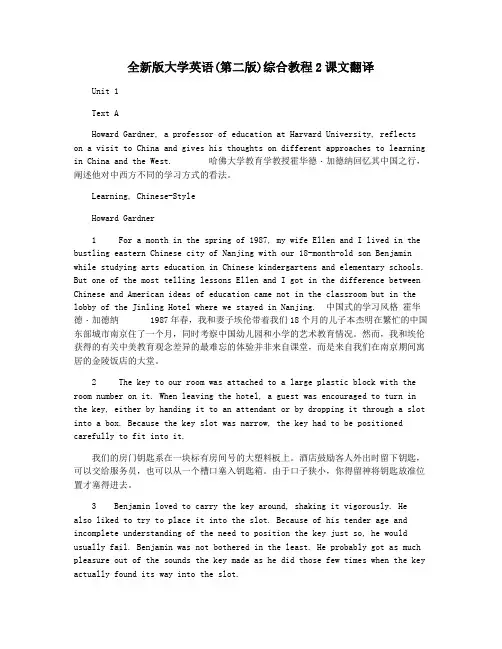
全新版大学英语(第二版)综合教程2课文翻译Unit 1Text AHoward Gardner, a professor of education at Harvard University, reflects on a visit to China and gives his thoughts on different approaches to learning in China and the West. 哈佛大学教育学教授霍华德・加德纳回忆其中国之行,阐述他对中西方不同的学习方式的看法。
Learning, Chinese-StyleHoward Gardner1 For a month in the spring of 1987, my wife Ellen and I lived in the bustling eastern Chinese city of Nanjing with our 18-month-old son Benjamin while studying arts education in Chinese kindergartens and elementary schools. But one of the most telling lessons Ellen and I got in the difference between Chinese and American ideas of education came not in the classroom but in the lobby of the Jinling Hotel where we stayed in Nanjing. 中国式的学习风格霍华德・加德纳 1987年春,我和妻子埃伦带着我们18个月的儿子本杰明在繁忙的中国东部城市南京住了一个月,同时考察中国幼儿园和小学的艺术教育情况。
然而,我和埃伦获得的有关中美教育观念差异的最难忘的体验并非来自课堂,而是来自我们在南京期间寓居的金陵饭店的大堂。
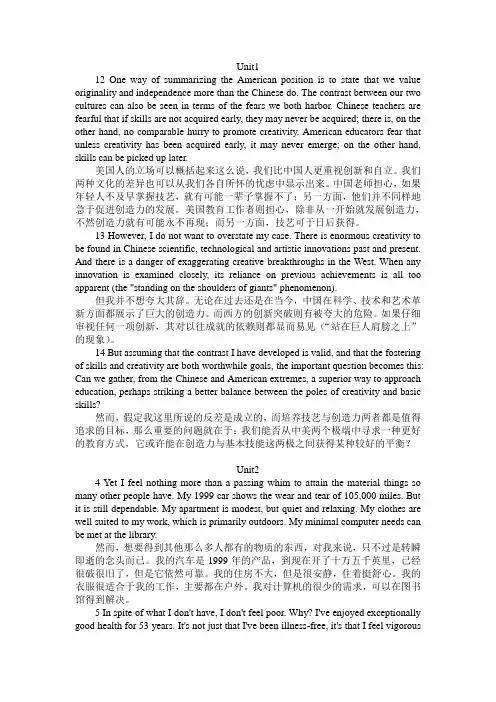
Unit112 One way of summarizing the American position is to state that we value originality and independence more than the Chinese do. The contrast between our two cultures can also be seen in terms of the fears we both harbor. Chinese teachers are fearful that if skills are not acquired early, they may never be acquired; there is, on the other hand, no comparable hurry to promote creativity. American educators fear that unless creativity has been acquired early, it may never emerge; on the other hand, skills can be picked up later.美国人的立场可以概括起来这么说,我们比中国人更重视创新和自立。
我们两种文化的差异也可以从我们各自所怀的忧虑中显示出来。
中国老师担心,如果年轻人不及早掌握技艺,就有可能一辈子掌握不了;另一方面,他们并不同样地急于促进创造力的发展。
美国教育工作者则担心,除非从一开始就发展创造力,不然创造力就有可能永不再现;而另一方面,技艺可于日后获得。
13 However, I do not want to overstate my case. There is enormous creativity to be found in Chinese scientific, technological and artistic innovations past and present. And there is a danger of exaggerating creative breakthroughs in the West. When any innovation is examined closely, its reliance on previous achievements is all too apparent (the "standing on the shoulders of giants" phenomenon).但我并不想夸大其辞。
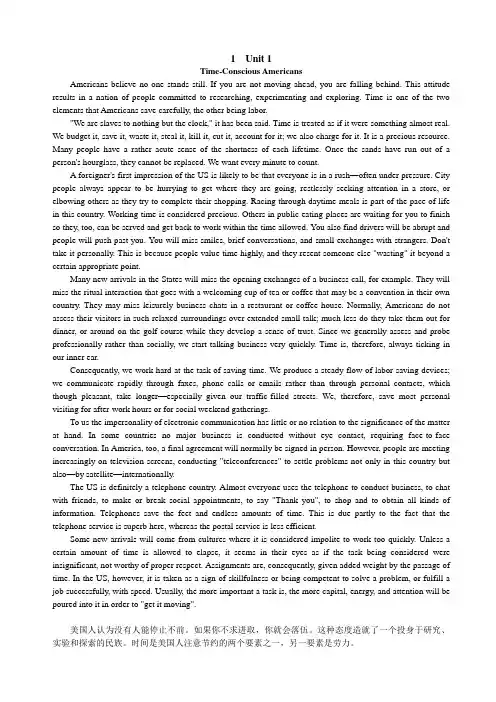
1 Unit 1Time-Conscious AmericansAmericans believe no one stands still. If you are not moving ahead, you are falling behind. This attitude results in a nation of people committed to researching, experimenting and exploring. Time is one of the two elements that Americans save carefully, the other being labor."We are slaves to nothing but the clock," it has been said. Time is treated as if it were something almost real. We budget it, save it, waste it, steal it, kill it, cut it, account for it; we also charge for it. It is a precious resource. Many people have a rather acute sense of the shortness of each lifetime. Once the sands have run out of a person's hourglass, they cannot be replaced. We want every minute to count.A foreigner's first impression of the US is likely to be that everyone is in a rush—often under pressure. City people always appear to be hurrying to get where they are going, restlessly seeking attention in a store, or elbowing others as they try to complete their shopping. Racing through daytime meals is part of the pace of life in this country. Working time is considered precious. Others in public eating-places are waiting for you to finish so they, too, can be served and get back to work within the time allowed. You also find drivers will be abrupt and people will push past you. You will miss smiles, brief conversations, and small exchanges with strangers. Don't take it personally. This is because people value time highly, and they resent someone else "wasting" it beyond a certain appropriate point.Many new arrivals in the States will miss the opening exchanges of a business call, for example. They will miss the ritual interaction that goes with a welcoming cup of tea or coffee that may be a convention in their own country. They may miss leisurely business chats in a restaurant or coffee house. Normally, Americans do not assess their visitors in such relaxed surroundings over extended small talk; much less do they take them out for dinner, or around on the golf course while they develop a sense of trust. Since we generally assess and probe professionally rather than socially, we start talking business very quickly. Time is, therefore, always ticking in our inner ear.Consequently, we work hard at the task of saving time. We produce a steady flow of labor-saving devices; we communicate rapidly through faxes, phone calls or emails rather than through personal contacts, which though pleasant, take longer—especially given our traffic-filled streets. We, therefore, save most personal visiting for after-work hours or for social weekend gatherings.To us the impersonality of electronic communication has little or no relation to the significance of the matter at hand. In some countries no major business is conducted without eye contact, requiring face-to-face conversation. In America, too, a final agreement will normally be signed in person. However, people are meeting increasingly on television screens, conducting "teleconferences" to settle problems not only in this country but also—by satellite—internationally.The US is definitely a telephone country. Almost everyone uses the telephone to conduct business, to chat with friends, to make or break social appointments, to say "Thank you", to shop and to obtain all kinds of information. Telephones save the feet and endless amounts of time. This is due partly to the fact that the telephone service is superb here, whereas the postal service is less efficient.Some new arrivals will come from cultures where it is considered impolite to work too quickly. Unless a certain amount of time is allowed to elapse, it seems in their eyes as if the task being considered were insignificant, not worthy of proper respect. Assignments are, consequently, given added weight by the passage of time. In the US, however, it is taken as a sign of skillfulness or being competent to solve a problem, or fulfill a job successfully, with speed. Usually, the more important a task is, the more capital, energy, and attention will be poured into it in order to "get it moving".美国人认为没有人能停止不前。

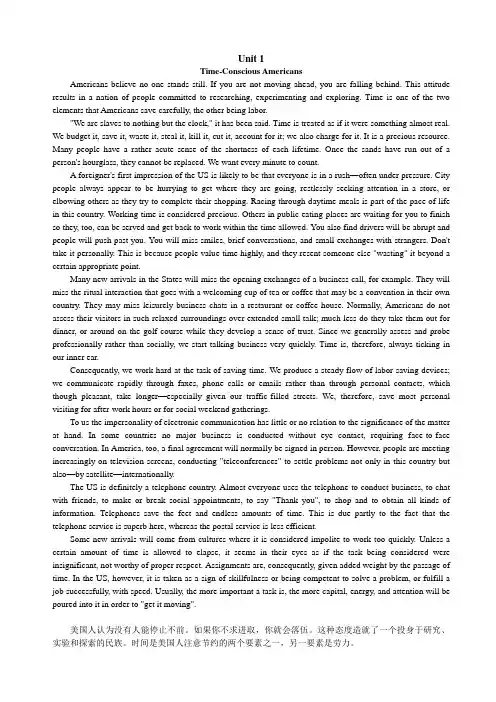
Unit 1Time-Conscious AmericansAmericans believe no one stands still. If you are not moving ahead, you are falling behind. This attitude results in a nation of people committed to researching, experimenting and exploring. Time is one of the two elements that Americans save carefully, the other being labor."We are slaves to nothing but the clock," it has been said. Time is treated as if it were something almost real. We budget it, save it, waste it, steal it, kill it, cut it, account for it; we also charge for it. It is a precious resource. Many people have a rather acute sense of the shortness of each lifetime. Once the sands have run out of a person's hourglass, they cannot be replaced. We want every minute to count.A foreigner's first impression of the US is likely to be that everyone is in a rush—often under pressure. City people always appear to be hurrying to get where they are going, restlessly seeking attention in a store, or elbowing others as they try to complete their shopping. Racing through daytime meals is part of the pace of life in this country. Working time is considered precious. Others in public eating-places are waiting for you to finish so they, too, can be served and get back to work within the time allowed. You also find drivers will be abrupt and people will push past you. You will miss smiles, brief conversations, and small exchanges with strangers. Don't take it personally. This is because people value time highly, and they resent someone else "wasting" it beyond a certain appropriate point.Many new arrivals in the States will miss the opening exchanges of a business call, for example. They will miss the ritual interaction that goes with a welcoming cup of tea or coffee that may be a convention in their own country. They may miss leisurely business chats in a restaurant or coffee house. Normally, Americans do not assess their visitors in such relaxed surroundings over extended small talk; much less do they take them out for dinner, or around on the golf course while they develop a sense of trust. Since we generally assess and probe professionally rather than socially, we start talking business very quickly. Time is, therefore, always ticking in our inner ear.Consequently, we work hard at the task of saving time. We produce a steady flow of labor-saving devices; we communicate rapidly through faxes, phone calls or emails rather than through personal contacts, which though pleasant, take longer—especially given our traffic-filled streets. We, therefore, save most personal visiting for after-work hours or for social weekend gatherings.To us the impersonality of electronic communication has little or no relation to the significance of the matter at hand. In some countries no major business is conducted without eye contact, requiring face-to-face conversation. In America, too, a final agreement will normally be signed in person. However, people are meeting increasingly on television screens, conducting "teleconferences" to settle problems not only in this country but also—by satellite—internationally.The US is definitely a telephone country. Almost everyone uses the telephone to conduct business, to chat with friends, to make or break social appointments, to say "Thank you", to shop and to obtain all kinds of information. Telephones save the feet and endless amounts of time. This is due partly to the fact that the telephone service is superb here, whereas the postal service is less efficient.Some new arrivals will come from cultures where it is considered impolite to work too quickly. Unless a certain amount of time is allowed to elapse, it seems in their eyes as if the task being considered were insignificant, not worthy of proper respect. Assignments are, consequently, given added weight by the passage of time. In the US, however, it is taken as a sign of skillfulness or being competent to solve a problem, or fulfill a job successfully, with speed. Usually, the more important a task is, the more capital, energy, and attention will be poured into it in order to "get it moving".美国人认为没有人能停止不前。
Unit112 One way of summarizing the American position is to state that we value originality and independence more than the Chinese do. The contrast between our two cultures can also be seen in terms of the fears we both harbor. Chinese teachers are fearful that if skills are not acquired early, they may never be acquired; there is, on the other hand, no comparable hurry to promote creativity. American educators fear that unless creativity has been acquired early, it may never emerge; on the other hand, skills can be picked up later.美国人的立场可以概括起来这么说,我们比中国人更重视创新和自立。
我们两种文化的差异也可以从我们各自所怀的忧虑中显示出来。
中国老师担心,如果年轻人不及早掌握技艺,就有可能一辈子掌握不了;另一方面,他们并不同样地急于促进创造力的发展。
美国教育工作者则担心,除非从一开始就发展创造力,不然创造力就有可能永不再现;而另一方面,技艺可于日后获得。
13 However, I do not want to overstate my case. There is enormous creativity to be found in Chinese scientific, technological and artistic innovations past and present. And there is a danger of exaggerating creative breakthroughs in the West. When any innovation is examined closely, its reliance on previous achievements is all too apparent (the "standing on the shoulders of giants" phenomenon).但我并不想夸大其辞。
Unit 1Text AHoward Gardner, a professor of education at Harvard University, reflects on a visit to China and gives his thoughts on different approaches to learning in China and the West.哈佛大学教育学教授霍华德·加德纳回忆其中国之行,阐述他对中西方不同的学习方式的看法。
Learning, Chinese-StyleHoward Gardner 1 For a month in the spring of 1987, my wife Ellen and I lived in the bustling eastern Chinese city of Nanjing with our 18-month-old son Benjamin while studying arts education in Chinese kindergartens and elementary schools. But one of the most telling lessons Ellen and I got in the difference between Chinese and American ideas of education came not in the classroom but in the lobby of the Jinling Hotel where we stayed in Nanjing.中国式的学习风格霍华德·加德纳1987年春,我和妻子埃伦带着我们18个月的儿子本杰明在繁忙的中国东部城市南京住了一个月,同时考察中国幼儿园和小学的艺术教育情况。
然而,我和埃伦获得的有关中美教育观念差异的最难忘的体验并非来自课堂,而是来自我们在南京期间寓居的金陵饭店的大堂。
全新版大学英语第二版综合教程2课文及翻译全新版大学英语第二版综合教程 2 是许多大学生在英语学习道路上的重要教材。
这本教程的课文涵盖了丰富多样的主题,从日常生活到学术研究,从文化传统到社会现象,为学生提供了广阔的知识视野和语言学习素材。
在“Unit 1 Ways of Learning”中,课文通过讲述一位父亲试图教导儿子骑自行车的经历,探讨了不同的学习方式和理念。
父亲坚持按照自己的方法指导儿子,却未能成功。
最终儿子通过自己的摸索和尝试,掌握了骑车的技巧。
这篇课文让我们明白,每个人都有适合自己的学习方式,有时候放手让学习者自己去探索和尝试,可能会取得更好的效果。
“Unit 2 Values”里的课文则聚焦于价值观的讨论。
通过描述不同人物在面对利益和道德抉择时的表现,引导学生思考什么是真正重要的价值观。
例如,在商业世界中,是追求短期的利润最大化,还是坚守诚信和社会责任?这样的思考有助于学生在成长过程中树立正确的价值观,做出符合自己内心信念的选择。
“Unit 3 The Generation Gap”探讨了代际之间的差异和沟通问题。
课文中描绘了父母与子女在观念、生活方式和目标追求上的种种不同,以及由此产生的矛盾和冲突。
然而,也指出了通过理解、尊重和积极的沟通,代际之间可以跨越鸿沟,建立更加和谐的关系。
在翻译这些课文时,需要准确把握原文的意思,同时要考虑到中英文语言习惯和文化背景的差异。
例如,在一些具有特定文化内涵的词汇和表达上,不能简单地进行字面翻译,而要进行适当的解释和转换,以使译文更符合目标语言的读者的理解。
以“Unit 4 The Virtual World”中的一段为例:“The Internet has transformed how we communicate, do business, and access information Ithas opened up a world of possibilities, but it has also brought along new challenges and concerns” 翻译为“互联网改变了我们交流、做生意和获取信息的方式。
全新版大学英语(第二版)综合教程2课文及翻译Unit1Howard Gardner, a professor of education at Harvard University, reflects on a visit to China and gives his thoughts on different approaches to learning in China and the West.哈佛大学教育学教授霍华德加德纳回忆其中国之行,阐述他对中西方不同的学习方式的看法。
Learning, Chinese-StyleHoward Gardner1 For a month in the spring of 1987, my wife Ellen and I lived in the bustling eastern Chinese city of Nanjing with our 18-month-old son Benjamin while studying arts education in Chinese kindergartens and elementary schools. But one of the most telling lessons Ellen and I got in the difference between Chinese and American ideas of education came not in the classroom but in the lobby of the Jinling Hotel where we stayed in Nanjing.中国式的学习风格霍华德加德纳1987年春,我和妻子埃伦带着我们18个月的儿子本杰明在繁忙的中国东部城市南京住了一个月,同时考察中国幼儿园和小学的艺术教育情况。
然而,我和埃伦获得的有关中美教育观念差异的最难忘的体验并非来自课堂,而是来自我们在南京期间寓居的金陵饭店的大堂。
大学英语精读第二册课文翻译(全)UNTH 2-1It is humorous essay. 这是一篇幽默的文章。
But after reading it you will surely find that the author is most serious in writing it.但是读过之后你将会发现作者写这篇文章的时候是很严肃的。
Is There Life on Earth? 地球上有生命吗?Art Buchwald阿特.布奇沃德There was great excitement on the planet of V enus this week. 金星上本周异常热闹。
For the first time V enusian scientists managed to land a satellite on the plant Earth, 那里的科学家首次成功地将一颗卫星送上了地球,and is has been sending back signals as well as photographs ever since. 从此卫星便一直不断地发回信号和照片。
The satellite was directed into an area know as Manhattan 卫星被发射到一个叫曼哈顿的地区(named after the great V enusian astronomer Prof. (它是用金星上伟大的天文学家曼哈顿教授的名字命名的, Manhattan, who first discovered it with his telescope 20,000 light years ago). 两万光年前是他首次用望远镜发现了该地区)。
Because of excellent weather conditions and extremely strong signals, 由于良好的天气条件以及高质量的信号,V enusian scientists were able to get valuable information 使得金星上的科学家们能够获得宝贵资料as to the feasibility of a manned flying saucer landing on Earth. 有关载人飞碟能否在地球上着陆。
新视野大学英语第二版第二册课文原文 Unit1 A foreigner's first impression of the US is likely to be that everyone is in a rush—often under pressure. City people always appear o be hurrying to get where they are going, restlessly seeking attention in a store, or elbowing others as they try to complete their shopping. Racing through daytime meals is part of the pace of life in this country. Working time is considered precious. Others in public eating-places are waiting for you to finish so they, too, can be served and get back to work within the time allowed. You also find drivers will be abrupt and people will push past you. You will miss smiles, brief conversations, and small exchanges with strangers. Don't take it personally. This is because people value time highly, and they resent someone else "wasting" it beyond a certain appropriate point. 外国人对美国的第一印象很可能是:每个人都匆匆忙忙──常常处于压力之下。城里人看上去总是在匆匆地赶往他们要去的地方,在商店里他们焦躁不安地指望店员能马上来为他们服务,或者为了赶快买完东西,用肘来推搡他人。白天吃饭时人们也都匆匆忙忙,这部分地反映出这个国家的生活节奏。人们认为工作时间是宝贵的。在公共用餐场所,人们都等着别人尽快吃完,以便他们也能及时用餐,你还会发现司机开车很鲁莽,人们推搡着在你身边过去。你会怀念微笑、简短的交谈以及与陌生人的随意闲聊。不要觉得这是针对你个人的,这是因为人们都非常珍惜时间,而且也不喜欢他人“浪费”时间到不 恰当的地步。 Unit3 Gail and I had no illusions about what the future held for us as a married,mixed couple in America. The continual source of our strength was our mutual trust and respect.We wanted to avoid the mistake made by many couples of marrying for the wrong reasons, and only finding out ten, twenty, or thirty years later that they were incompatible, that they hardly took the time to know each other, that they overlooked serious personality conflicts in the expectation that marriage was an automatic way to make everything work out right. That point was emphasized by the fact that Gail's parents, after thirty-five years Of marriage,were going through A bitter and painful divorce,which had destroyed Gail and for a time had a negative effect on our budding relationship 盖尔有时不明白为何我和其他黑人如此关注种族问题,而我感到吃惊的是,她好像忘记了美国社会中种族仇恨种种微妙的表现形式。对于成为居住在美国、异族通婚的夫妻,我和盖尔对未来没有不切实际的幻想。相互信任和尊重才是我们俩永不枯竭的力量源泉。 Unit5 There is a deep hurt that I feel as a mother. Some days it is a feeling of uselessness.I remember how carefully I ate when I was pregnant, how patiently I taught my daughter how to cross a street safely. For what, I sometimes wonder; so that she can struggle to breathe through most of her life feeling half her strength, and then die of self-poisoning, as her grandfather did? There is a quotation from a battered women's shelter that I especially like: "Peace on earth begins at home."I believe everything does. I think of a quotation for people trying to stop smoking: "Every home is a no-smoking zone." Smoking is a form of self-battering that also batters those who must sit by, occasionally joke or complain, and helplessly watch. I realize now that as a child I sat by, through the years, and literally watched my father kill himself: Surely one such victory in my family, for the prosperous leaders who own the tobacco companies, is enough. 作为母亲,我深深地感到痛苦。有时我有一种无能为力的感觉。我记得自己怀孕时,吃东西的时候是多么小心啊!之后在教她如何安全穿过马路时,又是多么耐心啊!有时我纳闷:自己这样做到底是为了什么?难道是为了她今后大半辈子有气无力地挣扎着呼吸,然后再像她外公那样自己把自己毒死吗?我特别喜欢一条写在受虐妇女收容所里的语录:“人间和平,始于家庭。”我认为世上所有的东西都是如此。我还想起了另一条写给那些想戒烟的人们的语录:“每个家庭都应该是禁烟区。”抽烟是一种自我毁灭,而且也毁灭着那些不得不坐在你身边的人。那些人偶尔也会取笑或抱怨你抽烟,可常常只能无可奈何地坐在一边看。我现在意识到,从我还是个孩子起,这些年来我实际上是一直坐在旁边,看着我父亲自杀。对那些生意兴隆的烟草公司的巨头们来说,能在我家取得这样一种胜利,肯定是够满意了。 Unit6 Names become attached to specific images, as anyone who's been called "a plain Jane" or "just an average Joe" can show. The latter name particularly bothers me since my name is Joe, which some think makes me more qualified to be a baseball player than, say, an art critic. Yet, despite this disadvantage, I did manage to become an art critic for a time. Even so, one prominent magazine consistently refused to print "Joe" in my by-line, using my first initials, J. S., instead. I suspect that if I were a more refined Arthur or Adrian, the name would have appeared complete. Of course, names with a positive sense can work for you and even encourage new acquaintances. A recent survey showed that American men thought Susan to be the most attractive female name, while women believed Richard and David were the most attractive for men. One woman I know turned down a blind date with a man named Harry because "he sounded dull". Several evenings later, she came up to me at a party, pressing for an introduction to a very impressive man; they'd been exchanging glances all evening. "Oh," I said. "You mean Harry." She was ill at ease. 名字是与特定形象相关联的,任何一个被称为“相貌平常的简”或“普普通通的乔”的人都能证明这一点。后面的那个名字特别使我烦恼,因为我也叫乔。有些人认为这个名字使我更适合于做一名棒球 运动员而不是别的什么职业,比如说艺术评论家。然而,尽管有此局限,我确实曾一度设法成为了一名艺术评论家。即便如此,一家著名杂志一直拒绝把“乔”作为我的文章署名,而是用我名字的首字母J. S.来代替。我怀疑,假如我的名